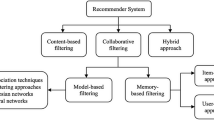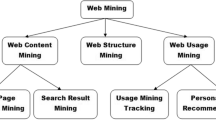Abstract
Recommender systems are useful tools to give personalized recommendations to users. One of the most popular techniques used in these systems is collaborative filtering. Recommender system algorithms get into trouble with data sparsity and scalability. These challenges cause lack of convergence in our algorithms. In this research, we propose a new method based on matrix factorization which alleviates data sparsity. We suggest a new method which can be performed as a preprocessing method for initial latent factor matrices of users and items. Initialized latent factors in matrix factorization lead to two advantages: (1) sparsity and scalability would be covered and (2) convergence of algorithms would be faster. We have shown that our method has improved the accuracy of optimization-based matrix factorization technique. Also it has increased the speed of matrix factorization convergence.


Similar content being viewed by others
References
Lee YL, Huang FH (2011) Recommender system architecture for adaptive green marketing. Expert Syst Appl 38(8):9696–9703
Taghipour N, Kardan A (2008) A hybrid web recommender system based on q-learning. In: Proceedings of the 2008 ACM symposium on Applied computing. pp 1164–1168. ACM
Yang X, Guo Y, Liu Y, Steck H (2014) A survey of collaborative filtering based social recommender systems. Comp Commun 41:1–10
Lü L, Medo M, Yeung CH, Zhang YC, Zhang ZK, Zhou T (2012) Recommender systems. Phys Rep 519(1):1–49
Anand D, Bharadwaj KK (2011) Utilizing various sparsity measures for enhancing accuracy of collaborative recommender systems based on local and global similarities. Expert Syst Appl 38(5):5101–5109
Adomavicius G, Tuzhilin A (2005) Toward the next generation of recommender systems: A survey of the state-of-the-art and possible extensions. Knowledge Data Eng IEEE Trans 17(6):734–749
Mazurowski MA (2013) Estimating confidence of individual rating predictions in collaborative filtering recommender systems. Expert Syst Appl 40(10):3847–3857
Luo X, Xia Y, Zhu Q (2012) Incremental collaborative filtering recommender based on regularized matrix factorization. Knowledge Based Syst 27:271–280
Breese JS, Heckerman D, Kadie C (1998) Empirical analysis of predictive algorithms for collaborative filtering. In: Proceedings of the Fourteenth conference on Uncertainty in artificial intelligence. pp 43–52. Morgan Kaufmann Publishers Inc
Kaminskas M, Ricci F (2012) Contextual music information retrieval and recommendation: state of the art and challenges. Comp Sci Rev 6(2):89–119
Su X, Khoshgoftaar TM (2009) A survey of collaborative filtering techniques. Adv Artificial Intell 2009(4):421–425
Park MH, Hong JH, Cho SB (2007) Location-based recommendation system using bayesian user’s preference model in mobile devices. In: Ubiquitous intelligence and computing. pp 1130–1139. Springer Berlin Heidelberg
Roh TH, Oh KJ, Han I (2003) The collaborative filtering recommendation based on SOM cluster-indexing CBR. Expert Syst Appl 25(3):413–423
Yager RR (2003) Fuzzy logic methods in recommender systems. Fuzzy Sets Syst 136(2):133–149
Gao L, Li C (2008) Hybrid personalized recommended model based on genetic algorithm. In: Wireless communications, networking and mobile computing, 2008. WiCOM’08. 4th International Conference on pp 1–4. IEEE
Shi Y, Larson M, Hanjalic A (2013) Unifying rating-oriented and ranking-oriented collaborative filtering for improved recommendation. Info Sci 229:29–39
Ricci F, Rokach L, Shapira B (2011) Introduction to recommender systems handbook. In: Recommender systems handbook. pp 1–35. Springer US
Shardanand U, Maes P (1995) Social information filtering: algorithms for automating “word of mouth”. In: Proceedings of the SIGCHI conference on Human factors in computing systems pp 210–217. ACM Press/Addison-Wesley Publishing Co
Gemmell J, Schimoler T, Mobasher B, Burke R (2012) Resource recommendation in social annotation systems: A linear-weighted hybrid approach. J Comp Syst Sci 78(4):1160–1174
Sarwar B, Karypis G, Konstan J, Riedl J (2001) Item-based collaborative filtering recommendation algorithms. In: Proceedings of the 10th international conference on World Wide Web. pp 285–295. ACM
Linden G, Smith B, York J (2003) Amazon. Com recommendations: item-to-item collaborative filtering. Internet Comput IEEE 7(1):76–80
Wang P (2012) A personalized collaborative recommendation approach based on clustering of customers. Phys Procedia 24:812–816
Bellogin A, Parapar J (2012) Using graph partitioning techniques for neighbour selection in user-based collaborative filtering. In: Proceedings of the sixth ACM conference on Recommender systems. pp 213–216. ACM
Guo G, Zhang J, Thalmann D (2014) Merging trust in collaborative filtering to alleviate data sparsity and cold start. Knowledge Based Syst 57:57–68
Jamali M, Ester M (2009) Trustwalker: a random walk model for combining trust-based and item-based recommendation. In: Proceedings of the 15th ACM SIGKDD international conference on Knowledge discovery and data mining. pp 397–406. ACM
Fong S, Ho Y, Hang Y (2008) Using genetic algorithm for hybrid modes of collaborative filtering in online recommenders. In: Hybrid intelligent systems, 2008. HIS’08. Eighth International Conference on. pp 174–179. IEEE
Sarwar B, Karypis G, Konstan J, Riedl J (2000) Application of dimensionality reduction in recommender systems: a case study”, In: Proceedings of ACM WebKDD web mining for e-commerce workshop. Boston, pp 82–90
Funk S (2006) Netflix Update: Try This At Home, http://sifter.org/~simon/journal/20061211.html
Kurucz M, Benczúr AA, Csalogány K (2007) Methods for large scale SVD with missing values. In: Proceedings of KDD cup and workshop Vol. 12, pp 31–38
Koren Y, Bell R, Volinsky C (2009) Matrix factorization techniques for recommender systems. Computer 8:30–37
Ma H, Zhou D, Liu C, Lyu MR, King I (2011) Recommender systems with social regularization. In: Proceedings of the fourth ACM international conference on Web search and data mining. pp 287–296. ACM
Nikulin V, Huang TH, Ng SK, Rathnayake SI, McLachlan GJ (2011) A very fast algorithm for matrix factorization. Stat & Probability Lett 81(7):773–782
Zhang CX, Zhang ZK, Yu L, Liu C, Liu H, Yan XY (2014) Information filtering via collaborative user clustering modeling. Physica A Stat Mech Appl 396:195–203
Nasiri M, Rezghi M, Minaei B (2014) Effect of rating time for cold start problem in collaborative filtering. Int J Oper Res, Pp
Nasiri M, Sharifi Z, Minaei B (2015) Alleviate sparsity problem using hybrid model based on spectral co-clustering and tensor factorization, Computer and Knowledge Engineering (ICCKE), 2015 5th International Conference on,IEEE, Pp 285–289
Sharifi Z, Rezghi M, Nasiri N (2014) A new algorithm for solving data sparsity problem based-on Non negative matrix factorization in recommender systems, Computer and Knowledge Engineering (ICCKE), 2014 4th International eConference on, pp 56–61
Sharifi Z, Rezghi M, Nasiri N (2013) New Algorithm for recommender systems based on singular value decomposition method, computer and knowledge engineering (ICCKE)
Esmaeili L, Nasiri M, Minaei-Bidgoli B (2013) Analyzing Persian social networks: an empirical study, IGI global, pp 167–172
Esmaeili L, Nasiri M, Minaei-Bidgoli B (2011) Personalizing group recommendation to social network users, Web Information Systems and Mining, pp 124–133
Esmaeili L, Nasiri M, Minaei-Bidgoli B (2012) Hybrid recommender system for joining virtual communities, Res J Appl Sci pp 500–509
Hu Y, Koren Y, Volinsky C (2008) Collaborative filtering for implicit feedback datasets, data mining, ICDM ’08. Eighth IEEE International Conference on, pp 263 – 272
Author information
Authors and Affiliations
Corresponding author
Rights and permissions
About this article
Cite this article
Nasiri, M., Minaei, B. Increasing prediction accuracy in collaborative filtering with initialized factor matrices. J Supercomput 72, 2157–2169 (2016). https://doi.org/10.1007/s11227-016-1717-8
Published:
Issue Date:
DOI: https://doi.org/10.1007/s11227-016-1717-8




